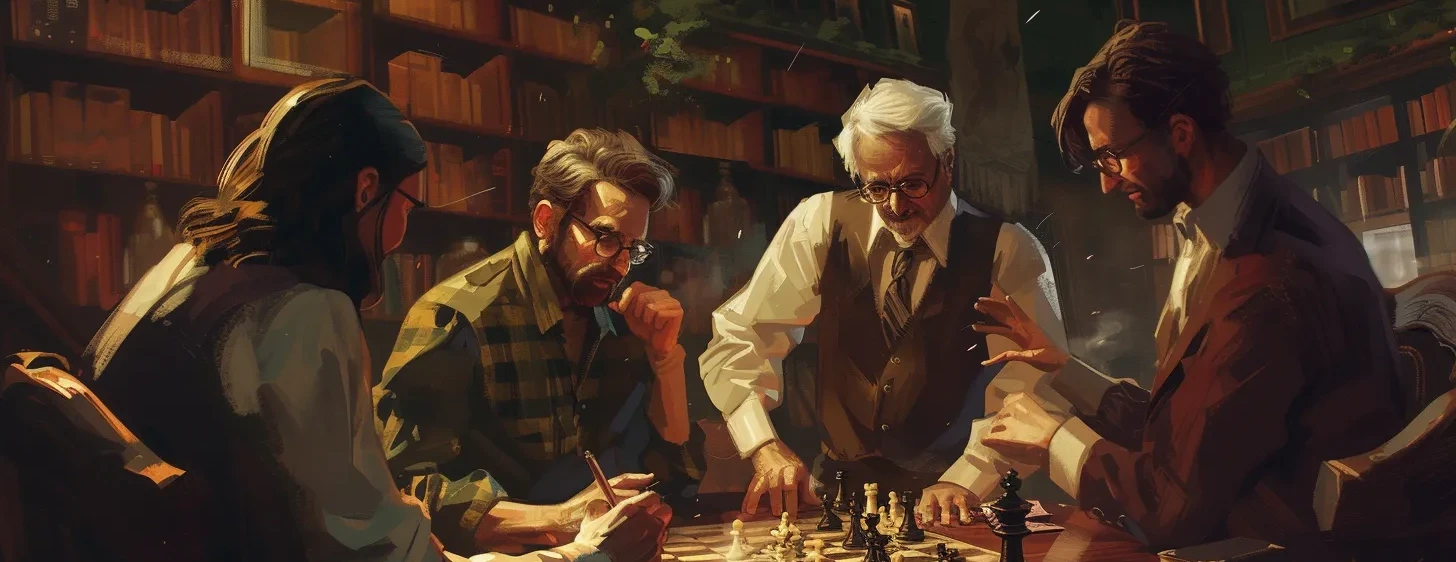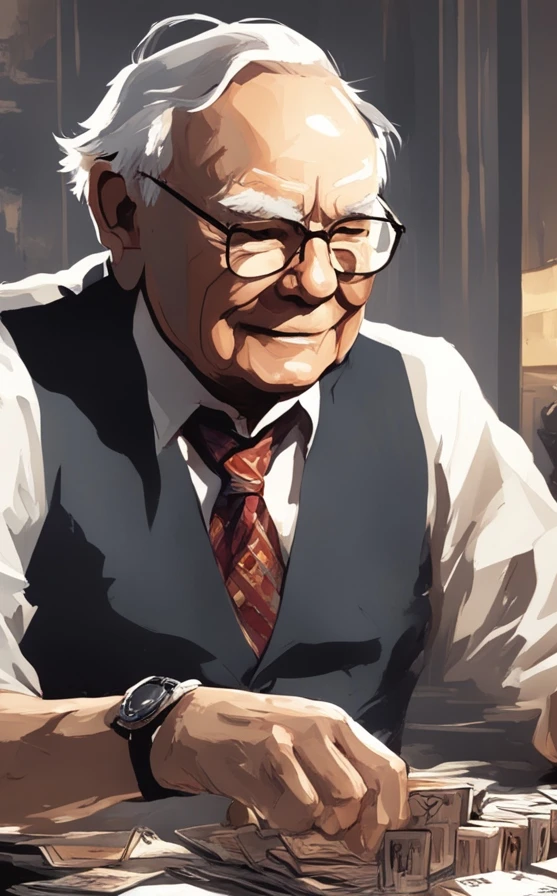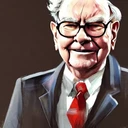Tags: Comments / Warren Buffett
This fanpage is not officially affiliated with Berkshire Hathaway: Disclaimer
Calling all Berkshire Hathaway shareholders! Dive into the fascinating world of Warren Buffett's favorite game, bridge, and discover how it has shaped his unparalleled success in the investment world. From strategic thinking to risk management, this article explores the valuable lessons that bridge, chess, and poker offer for enhancing your investment acumen. Get ready to level up your investment game!

Introduction
Imagine Warren Buffett, one of the world's most successful investors and the CEO of Berkshire Hathaway, sitting at a bridge table, intensely concentrating on his cards ↗. It's not the high stakes of the stock market that have captured his attention this time, but the strategic game of bridge. This anecdote may seem surprising to some, but for Buffett, bridge is more than just a pastime; it's a source of intellectual stimulation and a tool for honing his investment acumen. Buffett himself has proclaimed bridge to be the best intellectual exercise, attributing some of his success in making rational investment decisions to the skills and qualities developed at the bridge table 1.
This article aims to delve into the fascinating connection between Warren Buffett's favorite game and his unparalleled success in the investment world. Unlike other business magnates who may prefer golf or sailing as their leisure activities, Buffett's choice of bridge is telling of his unique approach to investment. Through exploring the intellectual stimulation provided by bridge, comparing it with other mental games like chess and poker, and drawing lessons for Berkshire Hathaway shareholders, we aim to entertain, inform, and offer a fresh perspective on investment strategies.
At the heart of Buffett's investment philosophy lies the concept of "patient opportunism"—a principle that bridge has helped him master 1. As we navigate through this article, we'll uncover how mental games, particularly bridge, can significantly influence business and investment decisions, providing a bridge to success that is both literal and metaphorical.
The Intellectual Stimulation of Bridge
Bridge is not just a game of luck; it's a cerebral endeavor that demands intense concentration and mental agility 3. For Warren Buffett, bridge acts as a rigorous mental workout, challenging him to forge new neural connections and build mental strength with each game played 1. This continuous brain exercise is akin to a daily training regimen for the mind, preparing it for the complexities of investment decisions.
One of the unique aspects of bridge is the concept of Duplicate Bridge, where the element of luck is minimized, and the focus shifts to skill, strategy, and long-term results. This approach mirrors Buffett's investment strategy, where short-term losses are viewed in the context of long-term gains, emphasizing the importance of focusing on the bigger picture rather than getting bogged down by temporary setbacks 1.
Buffett's dedication to bridge is evident in his routine of playing online most nights, a testament to his commitment to the game and its benefits 3. This regular engagement with bridge not only sharpens his decision-making skills but also keeps him mentally agile—a crucial trait for navigating the ever-changing landscape of the business world.
Moreover, bridge strategies closely resemble business decisions. As Buffett himself has noted, both realms require gathering all available information, continuously updating one's knowledge base, and making decisions based on probabilities. This alignment between bridge and business strategies underscores the game's value in enhancing one's ability to make informed, rational decisions 1.

Bridge and Business: The Buffett Way
The parallels between bridge and investing are striking, with both requiring a deep understanding of probabilities and the ability to make intelligent decisions based on available information 4. Warren Buffett's comparison of bridge to investing highlights the game's role in teaching him the significance of understanding human behavior—a skill that is equally crucial in the realm of business 1.
Communication and partnership are at the core of bridge, mirroring the teamwork essential in successful business ventures. The game's emphasis on collaboration and strategic communication has parallels in the way businesses operate, where effective teamwork can be the difference between success and failure 3.
Buffett's influence extends beyond his personal enjoyment of bridge; he introduced Bill Gates to the game in the late 1990s, leading to joint participation in tournaments and symbolizing the merging of strategic minds 4. Furthermore, the Buffett Cup bridge tournament, sponsored by Buffett, serves to promote the game within the business community, highlighting its perceived value in developing strategic thinking and decision-making skills 4.
The lessons of bridge also resonate with the teachings of Ben Graham, Buffett's mentor, particularly the emphasis on playing a hand right. This principle of making rational decisions, irrespective of the outcome, aligns with the disciplined approach required in both bridge and investing 1.
The game of bridge offers more than just entertainment for Warren Buffett; it serves as a training ground for the intellectual and strategic skills essential in the business world. The parallels between bridge strategies and investment decisions underscore the game's value as a tool for enhancing mental agility, strategic thinking, and decision-making abilities—qualities that have undoubtedly contributed to Buffett's success as an investor. Through bridge, Buffett has found a unique way to bridge the gap between leisure and business, turning his favorite game into a cornerstone of his investment philosophy.
Warren Buffett himself elaborated on the similarities between Bridge and the business world 1:
The approach and strategies are very similar in that you gather all the information you can and then keep adding to that base of information as things develop. You do whatever the probabilities indicated based on the knowledge that you have at that time, but you are always willing to modify your behavior or your approach as you get new information.
In contrast to bridge's emphasis on collaboration and strategic communication, two other popular games share similarities with investing, which we discuss in the following.

Comparative Analysis: Chess and Poker
When considering the intellectual exercises that have honed the acumen of one of the world's most successful investors, Warren Buffett, bridge often takes center stage. However, a deeper dive into the realms of chess and poker reveals a rich tapestry of strategic thinking, risk management, and psychological insight that also parallels the world of investing.
Chess, much like bridge, is a game of long-term strategic planning and mental agility. It teaches players to think several moves ahead, weighing the potential outcomes of their strategies. This mirrors the investment approach where a long-term mindset is crucial for achieving superior returns. Chess instills resilience and adaptability in its players—traits that are indispensable in the volatile world of investing. The lessons learned from each chess match, especially in defeat, underscore the importance of persistence and learning from one's mistakes, a concept that is echoed in the patience required to see long-term investments come to fruition 5.
Chess Grandmaster Alexander Kotov said on chess planning and strategy 7:
It is better to follow out a plan consistently, even if it isn't the best one, than to play without a plan at all. The worst thing is to wander about aimlessly.
This quote probably resonates well with long-term shareholders of Berkshire Hathaway!
Poker, on the other hand, brings a different set of skills to the table, emphasizing risk management, the ability to read people, and making decisions based on incomplete information. Research has shown that hedge fund managers with poker-playing experience tend to outperform their peers, suggesting a correlation between poker proficiency and investment success ↗. This could be attributed to the poker player's knack for quickly selling off losing investments and not hesitating to capitalize on winners 6. Furthermore, poker teaches the importance of thinking in probabilities, a skill that Warren Buffett himself has highlighted as crucial for successful investing 2.
Former World Series of Poker champion, Annie Duke, famously said 8:
Poker... is a game of incomplete information. It is a game of decision-making under conditions of uncertainty over time …valuable information remains hidden. There is also an element of luck in any outcome. You could make the best possible decision at every point and still lose the hand.
Or, to put it more bluntly in the words of John Bogle about stock market predictions 8: "Nobody Knows Nothing."
When comparing bridge, chess, and poker, it becomes evident that each game contributes uniquely to the development of a well-rounded investor. Bridge offers lessons in patience and understanding human behavior, chess encourages strategic long-term thinking and resilience, while poker highlights the importance of risk management and psychological insight.
| Game | Key Investment Skills Developed |
|---|---|
| Bridge | Patient opportunism, understanding human behavior, long-term focus |
| Chess | Strategic long-term thinking, resilience, adaptability |
| Poker | Risk management, reading people, thinking in probabilities |
This comparative analysis underscores the multifaceted nature of investment acumen, suggesting that a combination of skills honed through these games can lead to a more nuanced and successful investment strategy.
Lessons for Berkshire Hathaway Shareholders
For Berkshire Hathaway shareholders, the principles gleaned from bridge—and by extension, chess and poker—offer invaluable lessons in investment strategy. Warren Buffett's success is not merely a product of his understanding of numbers but also his approach to decision-making and risk management, much of which is mirrored in these games.
Shareholders should heed Buffett's advice to focus on the economics of companies and the probability of events. This approach, akin to thinking in probabilities in poker, encourages investors to look beyond short-term market fluctuations and base their decisions on fundamental, long-term economic prospects 2.
The concept of patient opportunism, learned at the bridge table, is particularly relevant. It teaches investors the value of waiting for the right opportunity rather than succumbing to the frenetic pace of market trends. This patience, coupled with a strategic, long-term perspective, can significantly reduce transaction and capital gains costs, leading to superior investment returns 12.
Furthermore, Buffett's practice of continuous learning and adaptability, inspired by his nightly bridge games, is a model for shareholders. The investment landscape is perpetually changing, and the ability to adapt strategies based on new information is crucial. Understanding human behavior and effective communication, skills honed through bridge, can also enhance shareholders' business acumen and interpersonal relations, further contributing to their investment success 1.
Bridging the Gap: Implementing Game Strategies in Investing
To incorporate the strategic lessons from bridge, chess, and poker into investing, shareholders can adopt several practical approaches. Maintaining mental agility and resilience in the face of market volatility is paramount. Chess, with its emphasis on strategic planning and learning from losses, offers a blueprint for navigating the ups and downs of the investment world 5.
Investors should also consider diversifying their learning and practice resources. Engaging in regular gameplay, whether bridge, chess, or poker, can sharpen the cognitive skills relevant to investing. Online platforms and local clubs provide ample opportunities to play and learn from more experienced players.
A balanced approach to risk management, inspired by poker, can prevent common pitfalls such as holding onto losing investments for too long. This involves setting clear criteria for buying and selling investments and sticking to them, even in the face of market pressure 6.
Developing communication skills and valuing partnerships, as in bridge, can also be beneficial. Investing, much like bridge, is not a solitary endeavor; it often involves interacting with others, whether brokers, financial advisors, or fellow investors. Effective communication and collaboration can lead to more informed decision-making and investment success.
Lastly, the importance of continuous learning and adapting strategies based on new information cannot be overstated. The investment world is dynamic, and what worked yesterday may not work tomorrow. Regularly updating one's knowledge base and being willing to pivot strategies in light of new information is a hallmark of both successful investors and game players.
By drawing on the strategic depth of bridge, chess, and poker, Berkshire Hathaway shareholders can enhance their investment acumen, leading to more informed decisions and, ultimately, greater success in the financial markets.

Conclusion
Throughout this article, we have explored the intricate relationship between Warren Buffett's passion for bridge and his unparalleled success in the investment world. We delved into the intellectual stimulation provided by bridge, its direct correlation with Buffett's business strategies, and how it compares with other strategic games like chess and poker. By examining these connections, we have unearthed valuable lessons for Berkshire Hathaway shareholders and investors at large, emphasizing the importance of strategic thinking and decision-making skills honed through these intellectual games.
Bridge, in particular, has been highlighted as a cornerstone in Buffett's life, not only serving as a source of enjoyment but also as a tool for sharpening his investment acumen. The game's demand for patience, analytical skills, and an understanding of human psychology mirrors the complexities of the investment world. Similarly, chess and poker offer their unique lessons, from the foresight and planning required in chess to the risk management and bluffing tactics in poker ↗. Each game, in its own way, contributes to building a more rounded strategic mindset beneficial for navigating the financial markets.
For Berkshire Hathaway shareholders and the broader investing community, engaging in these games can be more than just a pastime. It's an opportunity to enhance one's ability to think several moves ahead, weigh risks against potential rewards, and make decisions under uncertainty—skills that are invaluable in the realm of investing.
Warren Buffett himself has underscored the value of bridge in his life, famously stating, "I wouldn't mind going to jail if I had three cellmates who were decent players and who were willing to keep the game going 24 hours a day." This quote not only reflects Buffett's love for the game but also hints at the profound impact it has had on his investment philosophy. The parallels between bridge and investing—a deep analysis of incomplete information, the importance of timing, and the ability to read others—are evident in Buffett's strategic approach to building Berkshire Hathaway's empire.
As we conclude, I invite readers to reflect on their investment strategies and consider how lessons from bridge, chess, and poker could enrich their decision-making processes. Engaging with these games is not merely an exercise in entertainment but a step toward enhancing one's strategic thinking, patience, and analytical skills—qualities that are indispensable in the investment world.
Let us take inspiration from Warren Buffett's journey and continuously seek ways to improve our investment and business skills. Whether you are a seasoned investor or just starting, the potential for these games to enrich your intellectual life and contribute to your investment success is immense. As we have seen, the bridge to success may very well be paved with cards, chess pieces, and poker chips.
In closing, remember that the pursuit of knowledge and strategic acumen is a lifelong journey. By embracing the lessons offered by bridge and other strategic games, we open ourselves to new avenues of learning and growth, setting the stage for greater investment success. Let the games begin!
References
-
Become a Better Investor These Holidays by Playing Bridge - www.linkedin.com ↩↩↩↩↩↩↩↩↩↩
-
8 Ways to Think Like Warren Buffett - www.investopedia.com ↩↩↩
-
Can Playing Bridge Make You a Better Investor? - rationalwalk.com ↩↩↩
-
Warren Buffett, Bridge Player - Stories and Quotes - www.bridgebum.com ↩↩↩
-
Playing chess can help you become an investor who can manage other people’s money. - longtermcoin.medium.com ↩↩
-
How Poker Makes You A Better Investor - www.forbes.com ↩↩
-
An Amazing Chess Quote That Can Make You as Rich - www.richasking.com ↩
-
Investing Is Like Poker, Not Chess - levelfa.com ↩↩











